
X Japan is a Japanese rock band from Chiba, formed in 1982 by drummer and pianist Yoshiki and lead vocalist Toshi. Starting as a predominantly power/speed metal band with heavy symphonic elements, they later gravitated towards a progressive sound with an emphasis on ballads. Besides being one of the first Japanese acts to achieve mainstream success while on an independent label, the group is widely credited as one of the pioneers of visual kei, a movement among Japanese musicians comparable to Western glam.
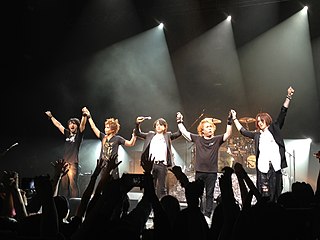
Luna Sea is a Japanese rock band formed in Kanagawa Prefecture in 1986. Due to the use of makeup and costumes early in their career and their widespread popularity, they are considered one of the most successful and influential bands in the visual kei movement. Throughout the mid-1990s they used significantly less makeup, and after a one-year break in 1997, came back with a more mainstream alternative rock style and toned down their on-stage attire. They disbanded in 2000. In 2003, HMV Japan ranked Luna Sea at number 90 on their list of the 100 most important Japanese pop acts.

Yoshiki Hayashi, known as Yoshiki, is a Japanese musician, songwriter, composer, record producer, film director, and fashion designer. He is best known as the leader of the visual kei rock bands X Japan and the Last Rockstars, for which he is the drummer, pianist, and main songwriter. He has been described by Billboard as a "musical innovator" and named "one of the most influential composers in Japanese history" by Consequence. Yoshiki's solo career includes several classical studio albums and collaborations with artists such as George Martin, Bono, will.i.am, St. Vincent, the Chainsmokers, Skrillex, Ellie Goulding, Stan Lee, Roger Taylor and Brian May of Queen, Gene Simmons and KISS, Nicole Scherzinger, and Sarah Brightman.

Extasy Records is a Japanese record label founded in April 1986 by Yoshiki Hayashi, co-founder of the heavy metal band X Japan. The label's first release was X's 1986 single "Orgasm".

Yūne Sugihara, born Yasuhiro Sugihara and better known by his stage name Sugizo, is a Japanese musician, songwriter, composer and record producer. He is best known as the lead guitarist and violinist of the rock band Luna Sea since 1989.

Hiroshi Morie, known exclusively by his stage name Heath, was a Japanese musician and singer-songwriter. He was best known as bass guitarist of the rock band X Japan from 1992 to 1997, and again from 2007 until his death in 2023.
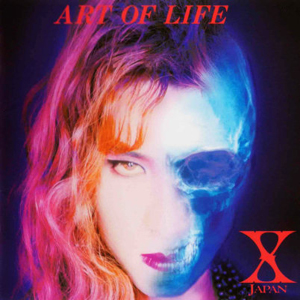
Art of Life is the fourth studio album by Japanese heavy metal band X Japan, released on August 25, 1993, by Atlantic Records. The album consists solely of the 29-minute-long orchestrated title track, which was written and composed by Yoshiki entirely in English and recorded with the Royal Philharmonic Orchestra. It topped the Oricon chart and has sold over 600,000 copies. The album is the band's first after changing their name from simply "X" and the first to feature bassist Heath.

Blue Blood is the second studio album by Japanese heavy metal band X Japan, then known as simply X. It was released on April 21, 1989, by CBS/Sony as the band's major label debut. Blue Blood sold more than 700,000 copies, reached number 6 on the Oricon chart and stayed on the chart for more than 100 weeks. The album's singles would also reach the top five on the chart. In 2007, Rolling Stone Japan ranked Blue Blood number 15 on their list of the "100 Greatest Japanese Rock Albums of All Time".

The discography of the Japanese heavy metal band X Japan consists of five studio albums, six live albums, one remix album, eleven compilations, one soundtrack album, 23 singles, and around 22 live video recordings.

"Orgasm" is the second single by Japanese heavy metal band X Japan, then named X, released on April 10, 1986.
"I.V." is a song by Japanese rock band X Japan, released on January 23, 2008, as a digital download. It was the group's first new material since "The Last Song," released almost a decade earlier in 1998. "I.V." is the main theme for the American film Saw IV, which was released on October 26, 2007.
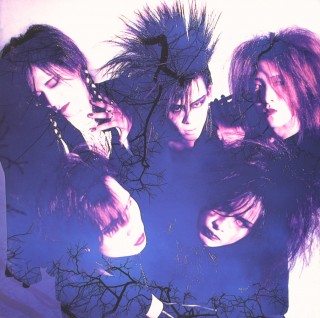
Luna Sea is the debut studio album by Japanese rock band Luna Sea, released on April 21, 1991, by Extasy Records. It sold over 30,000 copies by July 1992. After reuniting in 2010, Luna Sea re-recorded the whole album and released it on March 16, 2011, through HPQ.
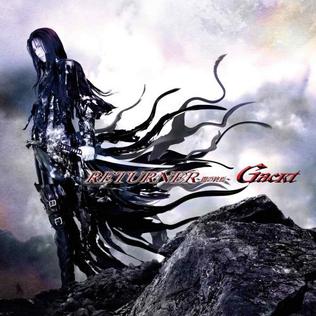
"Returner " is a single released by Gackt, on June 20, 2007, by Nippon Crown. It is Gackt's first single to top the Oricon Singles Chart, and first by record label since Kaze's "22-Sai no Wakare" released in 1975.
Skin is a United States–based Japanese visual kei rock supergroup founded by Japanese musicians Yoshiki, Gackt, Sugizo and Miyavi in 2007. The group's debut performance was on June 29, 2007, at Long Beach Arena, California. Although they had announced more activities, including a live tour and releasing an album, no new activities have occurred.

"Love Song" is the fourteenth single by Japanese rock band Luna Sea, released on November 8, 2000. It turned out to be the band's last single, as they held a press conference on the day of its release and announced they would be disbanding. They later reunited in 2010, and released "The One -Crash to Create-" in 2012. "Love Song" reached number 4 on the Oricon Singles Chart, and charted for five weeks.
"Scarlet Love Song" is a song by Japanese heavy metal band X Japan, written by Yoshiki. Created to be the theme song of the 2011 animated film Buddha, the version from the movie was released on June 8, 2011 as the band's first single to feature newest member Sugizo on guitar.

"Born to Be Free" is a song by Japanese rock band X Japan, released on November 6, 2015.

We Are X is a 2016 documentary film about the Japanese rock band X Japan and its co-founder, drummer, pianist and leader Yoshiki. Directed by Stephen Kijak, it premiered at the 2016 Sundance Film Festival on January 23. The film covers the history of the band, their influence on Japanese music and society, the band's break up in 1997 and reunion in 2007, and their attempts to achieve success overseas. It also covers Yoshiki's childhood with the X Japan's vocalist Toshi, the suicide of Yoshiki's father when Yoshiki was ten years old, the deaths of two members of the band, and Yoshiki's various health problems.
The untitled X Japan album is an unreleased studio album by Japanese heavy metal band X Japan. Initially planned to be half new songs and half re-recordings of old songs, this was abandoned at some point in its 10 years of production in favor of all new material. Several different release dates were announced in that time, but the album remains unpublished despite drummer and bandleader Yoshiki confirming its completion in September 2018. However, several songs reported to be on it have been made commercially available digitally. If released, it will be X Japan's first album of new material in over 28 years, their first since reuniting in 2007, and their first to feature newest member Sugizo. It will also be the last to feature longtime bass player Heath, due to his death in 2023.
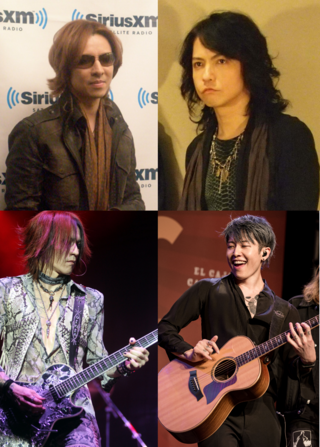
The Last Rockstars is a Japanese rock supergroup formed in 2022 by Yoshiki, Hyde, Sugizo, and Miyavi. The four members announced their collaboration in November 2022, and released their first self-titled single in December of the same year. In January 2023, the band performed their debut tour in Japan and the United States. In November 2024, it was announced that Miyavi had left the band.
















